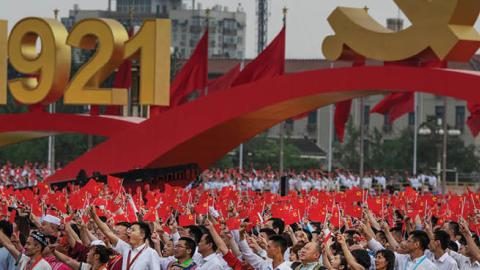Xi Jinping’s July 1 speech to commemorate the Chinese Communist Party’s centenary has received much fanfare. Accompanied by great pageantry, the speech was the CCP’s most significant public event in the past decade. All authoritarian states attach significant importance to public gatherings. These events give a visual demonstration of the faux solidarity between leadership and the people.
But events like this also reveal a great deal about an authoritarian regime’s self-perception. In a society like China’s, where a single party holds absolute political power, public pronouncements are a chance to signal to domestic and international audiences precisely how the regime defines itself, what it prioritizes, and which threats it thinks deserve a response.
This is particularly true in China, the world’s literary society par excellence. From the 3rd century Han dynasty to the Qing dynasty’s collapse in 1912, Chinese emperors relied upon a class of scholar-bureaucrats, termed mandarins by the Portuguese, to govern their territories. Selected through competitive intellectual examination, the members of this unique class were steeped in philosophical and historical literature. They attached overwhelming importance to speechcraft and the art of writing. The CCP carries forward this mandarin heritage, and as such, Xi’s directs several subtle signals toward the careful listener.
These signals convey a clear message: Xi Jinping’s Chinese Communist Party intends to direct the Chinese nation in a titanic struggle for global dominance. To this end, the Party and nation must prepare for conflict. And China’s first blow will fall on Taiwan.
Xi asserted that modern China is a continuation of five thousand years of Chinese history and is therefore the expression of a rich civilization and culture. But unmistakably, he views the CCP’s rule as the highest point of Chinese historical development. Hence his boast that “the socialist revolution” overturned “the exploitative and repressive feudal system that had persisted for thousands of years,” and Xi’s equivalence between China’s 5,000-year history and the Party’s 70 years of governance. Even more striking was the way Xi invoked China’s founding revolutionaries, foremost among them Mao Zedong. Naturally, Xi must profess loyalty to the CCP’s historical leaders and publicly advocate the maintenance of their ideologies. However, Xi indicates that the “socialist revolution” had one primary purpose – it “laid down the fundamental political conditions and the institutional foundations necessary for national rejuvenation”.
If the end or purpose of the socialist revolution is this “national rejuvenation”, then it follows that the individuals who execute this rejuvenation – that is, Xi Jinping’s CCP – have a unique role in this end. The CCP’s primary historical relevance is preparing the conditions for the present Party to achieve national rejuvenation, a theme reinforced by Xi’s refusal to speak of the Party’s history in more than generalities, outside of his broad historical overview. Moreover, the modern Party came into existence in 2012, when “socialism with Chinese characteristics entered a new era” with Xi’s accession to paramount leadership. Xi framed this in effect as almost a new founding of the Chinese nation.
Xi does not define national rejuvenation. The closest he comes is in his opening remarks, when he invokes the Party’s second centenary goal, “building China into a great modern socialist country in all respects.” One may, however, infer the objective of “national rejuvenation” from Xi’s discussion of China’s future, which he portrayed as lessons from its history. Three themes are apparent. First, the Party and the country are identical, an outgrowth of his previous remarks that Chinese history functionally began in 1921, with the CCP’s founding. Second, the Party must be unified. It must “keep in alignment with central Party leadership”, that is, with Xi’s vision. And third, the Party and nation must prepare for conflict. The Party must “accelerate the modernization of national defense” because of the “irrefutable truth that it must command the gun”.
Why does China need a “world-class” military? To protect, as Xi delineates, Chinese “sovereignty, security, and development interests.” This is not boilerplate. Xi mentions only one international organization in his entire speech, China’s neocolonial One Belt, One Road initiative. And after praising international cooperation, he pivots immediately to identifying the need for “the courage to fight” for China’s national dream, a dream that will require a greater struggle than ever before to achieve.
It is here that the Taiwan question comes to the fore. It is the last substantive remark in his speech, the denouement of his vision for Party and nation. Xi identifies only three specific territories in his speech — Hong Kong, Macau, and Taiwan — and the last receives particular attention. Notably, COVID-19 is never mentioned. Behind the advocacy for peaceful reunification is Xi’s true message. “Taiwan independence” is deemed a threat to Chinese national sovereignty and “territorial integrity.” And, the People’s Liberation Army is meant to secure this sovereignty.
Xi is correct to state that the future does belong to China’s youth. But he makes a specific demand of the Chinese people – that its young become, like China, “proud, confident, and assured” to “live up to...the expectations of our times, our Party, and our people.” For what trials does the Party expect the Chinese people to prepare? There is only one answer: the conflict necessary to achieve national rejuvenation, beginning over Taiwan, and securing for China global dominance.
Xi Jinping has made the use of force an integral element of Chinese foreign policy. That use of force is not limited to the “grey zone” “below threshold,” using the “salami-slicing” tactics that the U.S. foreign policy establishment insists are China’s modus operandi. The centenary speech objective is conquest: China will absorb Taiwan by military means if necessary and will accept the confrontation this will trigger between it and the United States. Xi said it. That he means it is beyond issue.
Read in RealClear World



















